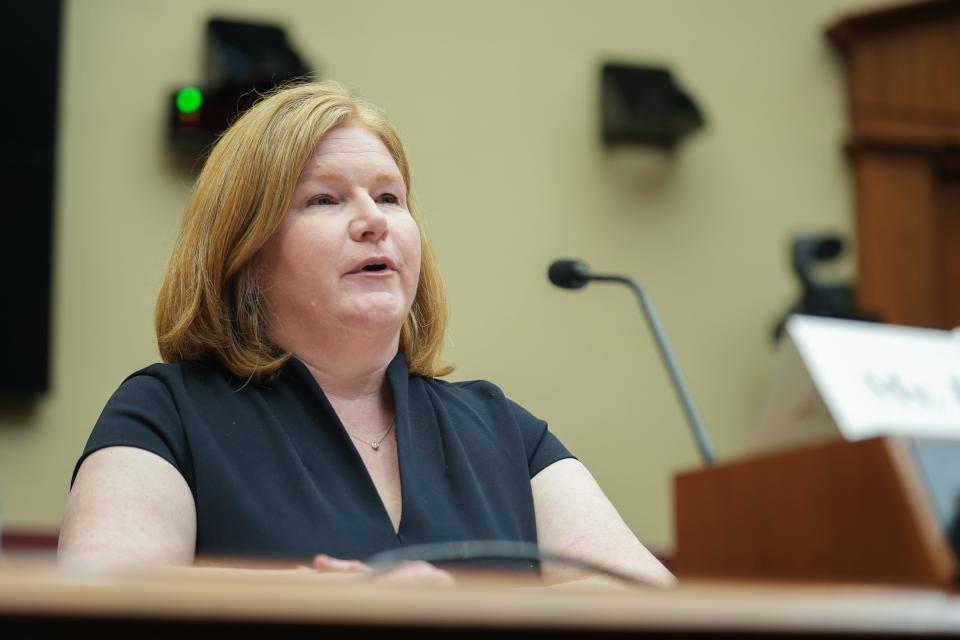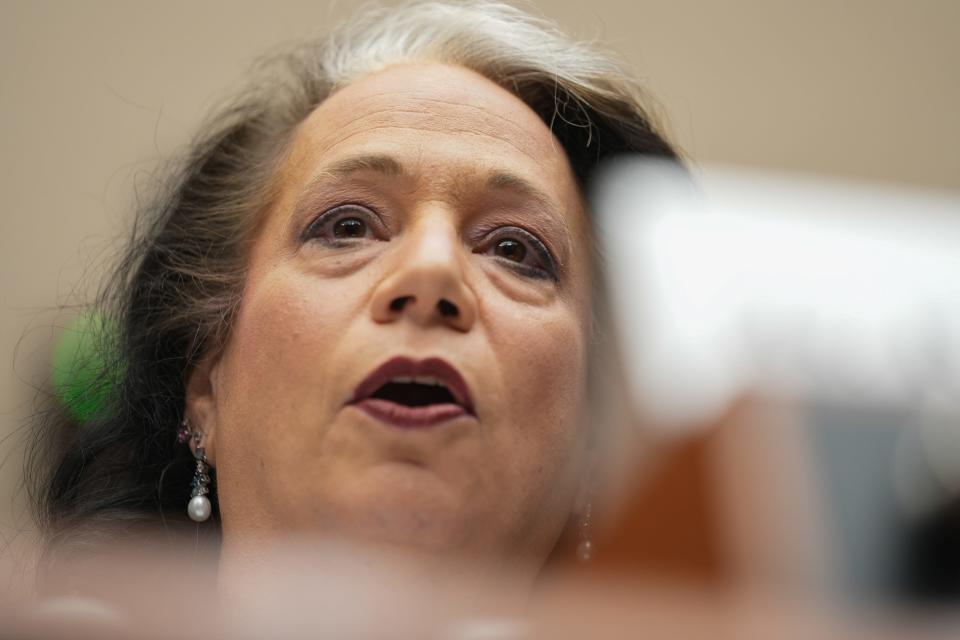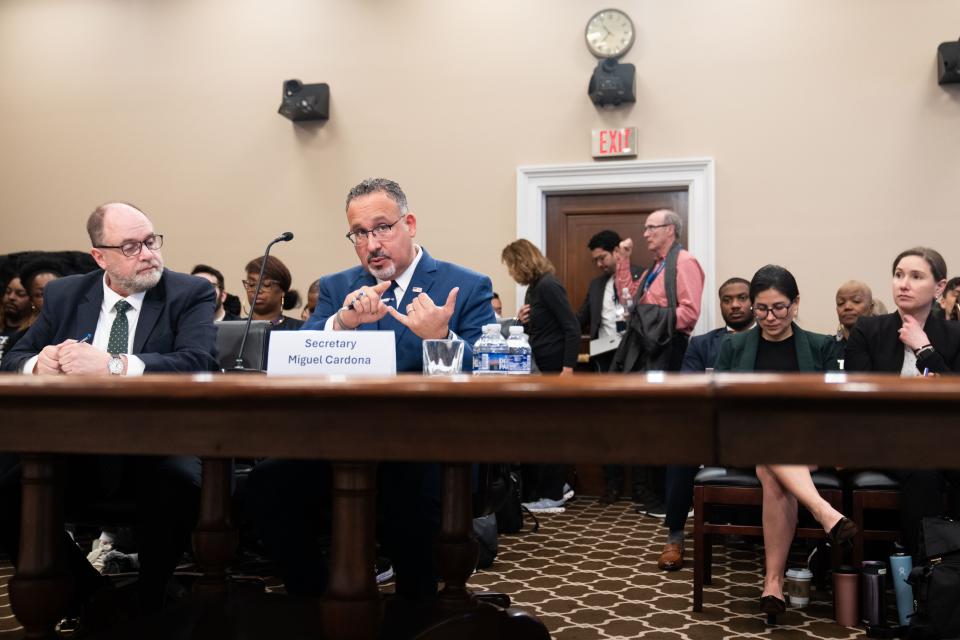Bipartisan frustration over bungled FAFSA rollout on full display in Washington
- Oops!Something went wrong.Please try again later.
Republicans and Democrats in Washington can agree on at least one thing lately: the Biden administration’s handling of college financial aid this year has been a mess.
High school seniors nationwide are awaiting aid offers with no concrete idea of when they're expected to land. At schools, officials say they don’t have all the information they need from the federal government to let families know how much they may have to pay. And the Education Department is scrambling to correct eleventh-hour data errors that affect more than 2 million anxious students.
At a congressional hearing Wednesday, the bipartisan exasperation with the mounting problems rose to a fever pitch.
A panel of college financial aid experts concerned about a potential enrollment crisis this fall bemoaned ongoing problems with the rollout of the new Free Application for Federal Student Aid, or FAFSA, and derided the Education Department over what some called a “crisis of credibility.” Even a Republican congressman from Texas who is the father of two high school seniors chimed in to say his family hasn't been immune from the delays.
Read more: The FAFSA blunders haven’t let up. Now the Education Department has a credibility issue.
Advocates closely tracking the unraveling of this year's financial aid process were breathless in their assessments.
“We have limited, precious weeks left," said Kim Cook, the CEO of the National College Attainment Network.

The hearing underscored a rare point of bipartisan agreement while painting a dire picture of the current college admissions landscape. At the behest of Congress, the federal government set out to simplify this year's FAFSA, but due to the bumpy rollout of those fixes, completion of the form was down 40% among high school seniors through the end of March, according to one tracker.
And high school seniors are by no means the only students who need to fill out the form. Most college students who need financial help to pay for school must submit it. The Education Department has received about seven million applications, officials said, down by about a third from this time last year.
College financial aid experts criticized the Education Department during the hearing on Capitol Hill for dressing up the repeated delays and mistakes in “celebratory publicity” in the agency's communications with schools. Some officials implied there was a need for accountability at the highest levels of the Education Department.
“If there was a financial aid director, or even a college president, that delayed financial aid on their campus for up to six months, the professional price that would be paid for that would be pretty steep,” said Justin Draeger, the president of the National Association of Student Financial Aid Administrators.
The Education Department said Tuesday more than a million students still need to make corrections to their FAFSAs before they can be finalized. The functionality for students to make those fixes still isn’t widely available, though, and the agency says it won’t be online until early next week. In yet another holdup, colleges will now have to wait until May 1 before they get all the corrected versions of the hundreds of thousands of applications tangled up in the mess created by the federal government.
Typically, May 1 is the deadline for high school seniors to decide where they want to attend college. In recent months, hundreds of schools have been forced to extend that date. But not all of them have done so, despite urging from officials at the Education Department. In the interim, students and parents told USA TODAY that if just one college on their list still is sticking to the May 1 deadline, they effectively all do.
Amid the heightened scrutiny, Education Department officials have worked hard in the past few weeks to improve their communication with schools. Rich Cordray, the chief operating officer for the Office of Federal Student Aid, said getting data to colleges as swiftly as possible remains a top priority.
Yet for students worried about whether college is attainable, the chaos this year has pushed their hopes of higher education further away, said Rachelle Feldman, the vice provost for enrollment at the University of North Carolina, Chapel Hill.
“I worry most, honestly, about a student in, say, rural North Carolina, who's heard all their life that college is out of their reach,” she said during the hearing. “They've worked hard for 12 years, but all the voices around them are saying they can't afford it. And we can't get them the document that proves they can. And we lose out on that talent.”

Republicans lay blame on Biden over student loan relief
A law passed by Congress in 2020 mandated an update to the FAFSA, which had been cluttered for years with more than 100 questions. The system's back end was decades old. For many families, filling out the oft-required form was a traumatic process that made college feel like even less of a possibility.
After requesting a yearlong extension, the Education Department was required to deliver the new, easier form by this college admissions season. A litany of glitches clogged up the process, leaving many students in a position where they'll have to make one of the most important decisions of their lives in weeks rather than months.
Read more: Colleges to Education Department: We don't have enough time to process FAFSA information
Republicans are blaming the Biden administration’s focus on student loan relief efforts, overseen by the same office in the Education Department in charge of changing the FAFSA. While the agency was busy canceling roughly $146 billion in student debt for more than four million Americans, GOP lawmakers say, its leaders deprioritized the FAFSA.
“It’s been a distraction,” said Mark Kantrowitz, a student financial aid expert who testified Wednesday. “They can’t have all hands on deck focusing on the FAFSA.”
At a separate budget hearing Wednesday elsewhere on Capitol Hill, Education Secretary Miguel Cardona pushed back on that idea.
“I don’t want you to think that they’re not doing FAFSA because they’re doing something else," he said of his employees, responding to a question from a Republican congresswoman on the matter. “It’s not either or.”

Democrats demand answers from outside vendor
Other critics, including some Education Department staffers, have grumbled that outside contractors who received millions of dollars to assist with the FAFSA rollout share a portion of the blame.
Senate Democrats sent a letter Wednesday morning to one of those companies, General Dynamics Information Technology, demanding to know what went wrong.
“It now appears that your efforts to date have been a near-total failure and that the FAFSA problems caused by this failure are harming millions of students and hundreds of colleges,” wrote Sens. Elizabeth Warren, D-Mass., and Ron Wyden, D-Ore.
Representatives for the company did not comment on the letter.
In the meantime, the Government Accountability Office, a nonpartisan federal watchdog, has launched two separate probes at the behest of congressional Republicans into the rollout of the new FAFSA. Those reviews are still in the early stages, according to the agency.
Zachary Schermele covers education and breaking news for USA TODAY. You can reach him by email at zschermele@usatoday.com. Follow him on X at @ZachSchermele.
This article originally appeared on USA TODAY: Congress puts FAFSA frustration on display: ‘Nothing but a disaster’

